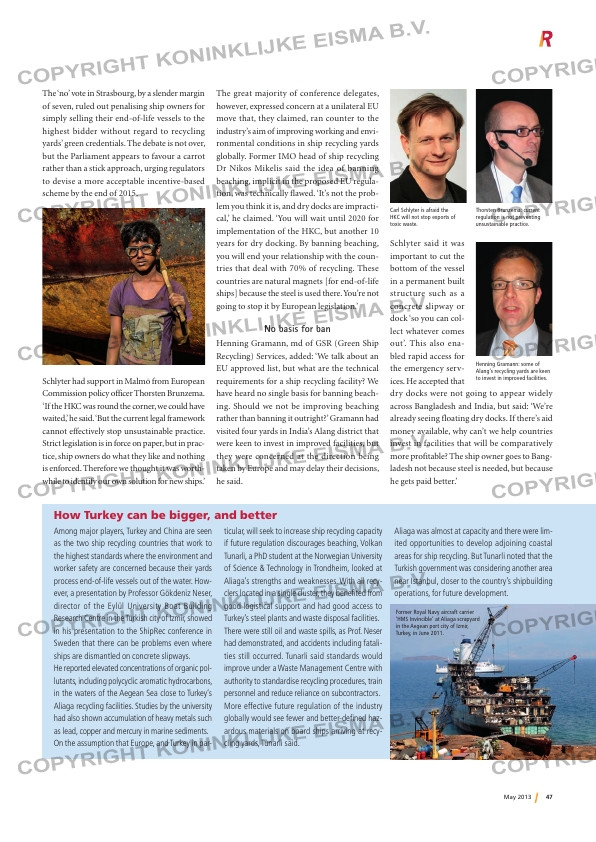Page 47 from: May 2013

47May 2013
The ‘no’ vote in Strasbourg, by a slender margin
of seven, ruled out penalising ship owners for
simply selling their end-of-life vessels to the
highest bidder without regard to recycling
yards’ green credentials. The debate is not over,
but the Parliament appears to favour a carrot
rather than a stick approach, urging regulators
to devise a more acceptable incentive-based
scheme by the end of 2015.
Schlyter had support in Malmö from European
Commission policy officer Thorsten Brunzema.
‘If the HKC was round the corner, we could have
waited,’ he said. ‘But the current legal framework
cannot effectively stop unsustainable practice.
Strict legislation is in force on paper, but in prac-
tice, ship owners do what they like and nothing
is enforced. Therefore we thought it was worth-
while to identify our own solution for new ships.’
The great majority of conference delegates,
however, expressed concern at a unilateral EU
move that, they claimed, ran counter to the
industry’s aim of improving working and envi-
ronmental conditions in ship recycling yards
globally. Former IMO head of ship recycling
Dr Nikos Mikelis said the idea of banning
beaching, implicit in the proposed EU regula-
tion, was technically flawed. ‘It’s not the prob-
lem you think it is, and dry docks are impracti-
cal,’ he claimed. ‘You will wait until 2020 for
implementation of the HKC, but another 10
years for dry docking. By banning beaching,
you will end your relationship with the coun-
tries that deal with 70% of recycling. These
countries are natural magnets [for end-of-life
ships] because the steel is used there. You’re not
going to stop it by European legislation.’
No basis for ban
Henning Gramann, md of GSR (Green Ship
Recycling) Services, added: ‘We talk about an
EU approved list, but what are the technical
requirements for a ship recycling facility? We
have heard no single basis for banning beach-
ing. Should we not be improving beaching
rather than banning it outright?’ Gramann had
visited four yards in India’s Alang district that
were keen to invest in improved facilities, but
they were concerned at the direction being
taken by Europe and may delay their decisions,
he said.
Schlyter said it was
important to cut the
bottom of the vessel
in a permanent built
structure such as a
concrete slipway or
dock ‘so you can col-
lect whatever comes
out’. This also ena-
bled rapid access for
the emergency serv-
ices. He accepted that
dry docks were not going to appear widely
across Bangladesh and India, but said: ‘We’re
already seeing floating dry docks. If there’s aid
money available, why can’t we help countries
invest in facilities that will be comparatively
more profitable? The ship owner goes to Bang-
ladesh not because steel is needed, but because
he gets paid better.’
Among major players, Turkey and China are seen
as the two ship recycling countries that work to
the highest standards where the environment and
worker safety are concerned because their yards
process end-of-life vessels out of the water. How-
ever, a presentation by Professor Gökdeniz Neser,
director of the Eylül University Boat Building
Research Centre in the Turkish city of Izmir, showed
in his presentation to the ShipRec conference in
Sweden that there can be problems even where
ships are dismantled on concrete slipways.
He reported elevated concentrations of organic pol-
lutants, including polycyclic aromatic hydrocarbons,
in the waters of the Aegean Sea close to Turkey’s
Aliaga recycling facilities. Studies by the university
had also shown accumulation of heavy metals such
as lead, copper and mercury in marine sediments.
On the assumption that Europe, and Turkey in par-
ticular, will seek to increase ship recycling capacity
if future regulation discourages beaching, Volkan
Tunarli, a PhD student at the Norwegian University
of Science & Technology in Trondheim, looked at
Aliaga’s strengths and weaknesses. With all recy-
clers located in a single cluster, they benefited from
good logistical support and had good access to
Turkey’s steel plants and waste disposal facilities.
There were still oil and waste spills, as Prof. Neser
had demonstrated, and accidents including fatali-
ties still occurred. Tunarli said standards would
improve under a Waste Management Centre with
authority to standardise recycling procedures, train
personnel and reduce reliance on subcontractors.
More effective future regulation of the industry
globally would see fewer and better-defined haz-
ardous materials on board ships arriving at recy-
cling yards, Tunarli said.
Aliaga was almost at capacity and there were lim-
ited opportunities to develop adjoining coastal
areas for ship recycling. But Tunarli noted that the
Turkish government was considering another area
near Istanbul, closer to the country’s shipbuilding
operations, for future development.
Former Royal Navy aircraft carrier
‘HMS Invincible’ at Aliaga scrapyard
in the Aegean port city of Izmir,
Turkey, in June 2011.
How Turkey can be bigger, and better
Carl Schlyter is afraid the
HKC will not stop exports of
toxic waste.
Thorsten Brunzema: current
regulation is not preventing
unsustainable practice.
Henning Gramann: some of
Alang’s recycling yards are keen
to invest in improved facilities.
RI-4_Shipbreaking2.indd 47 06-05-13 14:21



